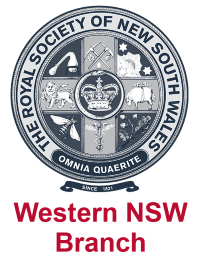Royal Society of NSW News & Events
Western NSW Branch Meeting 2022-1
 “Public Trust and Science in Times of Coronavirus”
“Public Trust and Science in Times of Coronavirus”
Robert Clancy AM FRSN
Michelle Grattan AO FASSA and
Jane Quinn
facilitated by Mark Evans
Date: Tuesday, 15 March 2022, 12.00 pm AEST
Venue: Council Room 104, The Grange, Building 1205, Charles Sturt University (Bathurst) and Zoom live streaming
Video presentation: YouTube video
All are welcome
Summary: Public trust is critically important for pandemic recovery. Without it, the confidence necessary to build an effective and sustained recovery is in peril. People need to trust the government to support more government intervention that makes a difference. In mid-2020, Australia was widely viewed by the public as having successfully managed the pandemic, especially compared to the US, UK, and other European countries. Australians’ trust in their government almost doubled in a year from 29% to 54%. The same is not the case today. Our latest research with the Social Research Institute at Ipsos conducted in October 2021 shows that trust in people in government has declined 12 points from 54% to 42% in a matter of months. Our survey findings suggest that institutions viewed as extending the protective power of democracy in a time of fear – safeguarding our civic culture and heritage, community security, health, and wellbeing – were most trusted. For example, note the high levels of trust in defence and law and order organisations such as the police (76%), army (73%), and the courts (61%). Moreover, the highest levels of trust are bestowed to Medicare (80%); cultural institutions such as libraries (82%) and museums (78); and universities (70%) and experts (79%). In contrast, institutions deemed, rightly or wrongly, to be acting on the basis of self-interest or against the collective interest faired worst. And unfortunately, politicians figure strongly. There is evidence of receding trust in political parties (20%), the national cabinet (38%), and other key institutions held responsible for bringing politics into disrepute such as television (35%), the press (30%) and especially social media (15%).
COVID-19 has brought to centre stage the role of the “expert” and "science", in the policy response to the most serious international health crisis in a century. This stands in stark contrast with the rise of populism in many liberal democracies in recent years which has been accompanied by a spurning of expertise. In short, Australian citizens trust scientists and this was the case even before the pandemic. The Wellcome Global Monitor ran a survey in 2019 on trust in science and scientists in over 140 countries, which also included a question on trust in national government. Australia ranks just 85th out of 134 countries for its level of political trust, but 14th out of 144 for trust in scientists, suggesting that in relative terms we have a high level of trust in scientists.
Given its trusted position on the frontline of public education, the purpose of this panel discussion is to evaluate the role that Science and more generally experts can and do play in enhancing democratic governance and bridging the trust divide between government and citizen.
Emeritus Professor Robert Llewellyn Clancy AM FRSN is a retired Australian clinical immunologist in the field of mucosal immunology. He is known for his research and development of therapies for chronic obstructive pulmonary disease, commonly known as emphysema. He is also Chair of the Advisory Board to Charles Sturt’s Regional and Rural Health Institute.
Professor Michelle Grattan AO FASSA is an Australian journalist who was the first woman to become editor of an Australian metropolitan daily newspaper. Specialising in political journalism, she has written and edited for many significant Australian newspapers. She is currently the chief political correspondent with The Conversation, Australia's largest independent news website. Michelle is a professorial fellow at the University of Canberra.
Professor Jane Quinn is an expert in Developmental Genetics at Charles Sturt University. She was awarded a PhD from the University of Edinburgh. Her research focuses on strategies to improve livestock productivity and economic outcomes for the Australian farming sector. She deploys innovative field and molecular technology-based approaches, and particularly novel pharmaceuticals or management practices for the animal health industries that aim to improve productivity in Australian sheep and beef systems, several of which have been awarded patent protection.
Professor Mark Evans (FIPPA, PhD) is Deputy Vice-Chancellor for Research at Charles Sturt University. His latest books (with Gerry Stoker) include Evidence-based Policymaking and the Social Sciences – Methods that Matter (Policy Press, 2017), Saving Democracy (Bloomsbury, 2022) and The Democratic Audit of Australia (LSE Press, 2022) and, with Michelle Grattan, From Turnbull to Morrison – Trust Divide (Melbourne University Press, 2019).
Background reading
-
Mark Evans and Michelle Grattan (2021), ‘Health Expertise and Covid-19 – Managing the Fear Factor,’ Australian Quarterly, 92, 2, pp. 20-28.
-
Mark Evans (2021), Scott Morrison's pandemic popularity has vanished along with public trust in our politicians, The Guardian, 16 November 2021,

